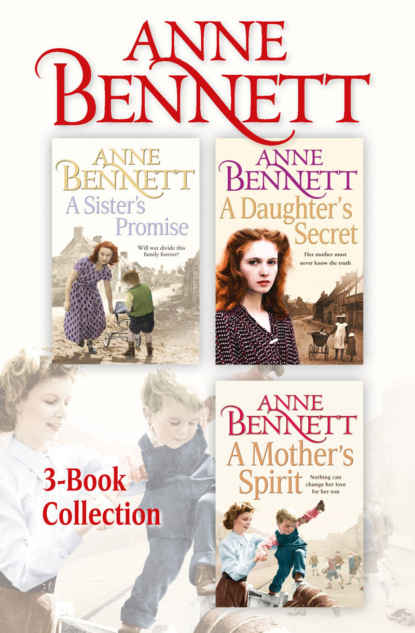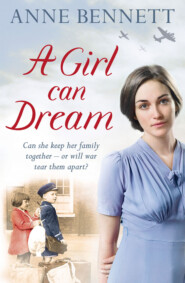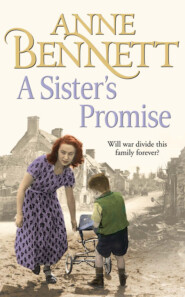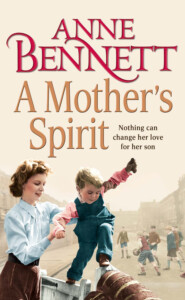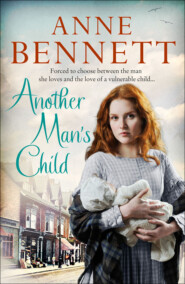По всем вопросам обращайтесь на: info@litportal.ru
(©) 2003-2025.
✖
Anne Bennett 3-Book Collection: A Sister’s Promise, A Daughter’s Secret, A Mother’s Spirit
Настройки чтения
Размер шрифта
Высота строк
Поля
‘It’s a deal,’ Tom said.
Afterwards, Molly was to see that walk she undertook with her uncle as a sort of turning point in her relationship with him. The tentative talks that had begun in the cowshed had opened the way for them and that day each found out more about the other’s life.
Molly could see how it had been for them all growing up on the farm, the three boys and the baby, Nuala, spoiled and petted by them all. She tried to paint the picture of her life before the tragedy. She wanted him to see how the adult Nuala had fared, of the fine man she had married and what a marvellous mother she was.
‘It wasn’t always easy for her, either,’ Molly said. ‘She wanted a houseful of children, she told me herself, but she lost three babies before Kevin was born. Then she was so ill giving birth to him that the doctor said there were to be no more.’
‘Ah, that must have been a disappointment for her.’
‘I’m sure it was,’ Molly said. ‘In fact, she said it had saddened her at first, but then she got over it and took pleasure in the children she had. That was the type of person she was, you see, someone really special. She said often people hanker for things they can’t have, until it takes over their lives and they miss enjoying the things they have got. I know that she would want me to always remember them, but not let their loss destroy my life totally.’
‘A wise woman, I’d say,’ Tom said. ‘And I regret the fact that I ever lost contact with her.’
‘So do I,’ Molly said. ‘I had thirteen years of loving care from my parents, while my little brother only had five. He never even knew his other grandma because she died just after his first birthday and it would have been nice for him to know – both of us, I suppose, but him especially – that there were other people that cared about us.’
‘I see that,’ Tom said. ‘Pity we can’t roll back the clock and have another go at the things we know with hindsight we did wrong. Was your other grandmother kind to you?’
‘She was lovely,’ Molly said, smiling at the memory. ‘She was round and cuddly, and her lap just the comfiest place to sit. Her house always smelled nice too, of cooking mainly, because she was always baking. When I would go and see her she always had cakes or something for me. Mom liked her too and they got on well. Granddad used to laugh and say the pair of them weren’t normal, that it was written in the rule book that they should be at it hammer and tongs.’
‘You must all have missed your grandmother when she died.’
‘We did, and it was so sudden,’ Molly said, casting her mind back. ‘I mean, she hadn’t been ill or anything. She was fine one minute and had a massive heart attack the next. I was nine then, and I didn’t think people just died like that. I was so shocked that for a while I didn’t believe she was really dead and, in the end, Granddad took me to see her and there she was lying in a coffin. I knew she was dead then. She didn’t look bad or anything, she looked just as if she was asleep, only you see I never saw my grandma so still before. She was always on the go – “on the batter”, Granddad used to call it.’
‘Does it upset you to talk about it?’ Tom asked, noting the reflective tone that had crept into Molly’s voice.
‘No, not upset really,’ Molly said. ‘It helps in a way. I mean, I wish none of it had happened, that my life with my parents and grandparents had gone on uneventfully for years and years and we would all live happy ever after. But life isn’t like that and you have to take the bad times with the good times and learn to cope with it.’
She smiled and looked up at Tom and said, ‘Your mother is about as bad as it gets, and for now, while I am a child, I have to put up with it, but she will have to chain me down when I am grown, for I will not stop here one moment longer than necessary.’
‘And I will not blame you one bit,’ Tom said earnestly.
‘Hilda was our next-door neighbour and Mom’s great friend,’ Molly said. ‘And just before I left she said that your mother was a very bitter and unhappy woman and I had not to let it drag me down; that I had to rise above it or it would destroy me too. She was lovely, Hilda, and I am dying to hear how they are all getting on. I’m sure they will write straight back.’
‘Look who is ahead of us,’ Tom said suddenly. ‘I knew we wouldn’t be the only ones out walking today. Good day, Nellie. Lovely afternoon.’
The postmistress stopped and smiled at them both. ‘Couldn’t be better,’ she said. ‘Hello, Molly. Lovely to see you enjoying the fine weather. You need more of it, get some roses in your cheeks, for you are far too pale. Not like my girl, Cathy here,’ she said, indicating the girl by her side, whose cheeks were like two rosy apples either side of her nose.
‘Huh, and when I go out in the sun,’ said the girl with a toss of her head, ‘all I get is more freckles.’
Molly saw the girl, who looked a similar age to herself, was right, for merry eyes danced in a face covered in little brown spots. She had glimpsed her in the chapel that morning, but her grandmother had seen to it that she had no chance of a conversation with anyone.
Tom smiled at the girl. ‘Ah, will you give over, Cathy,’ he said. ‘Sure, aren’t freckles just sun kisses?’
‘Kisses I can well do without,’ the girl said. She turned to Molly. ‘I saw you at Mass earlier and I really envied you your hair, for it is beautiful, while mine is dull brown and like a frizz in comparison.’
‘If you ask me, miss, you think too much about your appearance,’ Nellie told her daughter sharply, but Molly knew from her twinkling eyes that she wasn’t really cross. ‘And in Mass too, when you should have your mind on higher things.’
Cathy made no reply to this, though she looked not the slightest bit abashed and when she glanced across at Molly and surreptitiously gave her a wink, Molly decided that she liked Cathy McEvoy very much.
It seemed that the McEvoys liked her too, because Nellie said, ‘You must come and see us so that we can get to know you better. I am tied up with the post office through the week, but what about next Sunday for tea?’
Molly knew she would love it, but she also knew her grandmother would more than likely not allow it, but before she could open her mouth to say this, Tom said, ‘That would be lovely. You’d be delighted, wouldn’t you, Molly?’
‘Yes, but—’
‘So, shall we say four o’clock?’ Nellie said. ‘We eat about five so that gives you some time together first.’
‘Perfect,’ Tom said. ‘And I will come up later to leave Molly home.’
As they made their goodbyes and were on their way again, Molly said, ‘Uncle Tom, my grandmother won’t let me go there.’
‘Why not? What is wrong with going to tea with someone your own age?’
‘She doesn’t have to have a reason, you know that,’ Molly said. ‘And what about the tea and the milking and all?’
‘Molly, we managed fine before you came,’ Tom said. ‘And believe me, the house won’t fall to pieces because you are out of it for an hour or two next Sunday. I will ask you one question: do you want to go to tea at the McEvoys?’
‘I’d love to, but—’
‘Will you stop saying “but”,’ Tom said with a grin. ‘If you want to go then you shall go, or my name isn’t Tom Sullivan.’
SEVEN (#ulink_ef86af47-b6cd-5248-a39d-9f9d626197df)
First thing on Monday morning, Molly had to tackle the washing. All the time her mother had been ill and then in hospital, Molly had helped Hilda, who had done the bulk of the Maguire wash until she had been banished by Biddy. Molly had found the load a heavy one when placed totally on her shoulders, despite the big gas boiler and wringer above it, not to mention running water and big sinks.
Molly gazed at the mass of things to be washed that first morning in dismay, and Biddy watched her in almost gleeful satisfaction. She told her there was more washing than usual because while she had been away, Tom had just swilled out things as he needed them and she had better get on with it, and quickly. Nothing would get done by staring at it.
Tom had already filled three buckets of water, which he tipped into the big pot hanging above the fire while Molly put all the clothes into the pot with the soap powder, before joining her uncle in the cowshed.
Once the milking and breakfast was over, Molly had to ladle the water from the pot to the maiding tub, pounding the poss stick up and down like she had done at home, with stubborn stains rubbed against the washboard. Then the tub had to be emptied panful by panful until it was light enough for her to push to the doorway and let it drain into the gutter in front of the cottage, before filling it up again with the clean water for rinsing. Tom was in the fields by this time, so Molly had to fetch the water from the well herself. She found this a back-breaking enough job at the best of times, and however carefully she carried the water, some of it always slopped out and soaked the side of her dungarees.
The collars and cuffs on Tom’s shirts for Mass were detachable and had to be starched in a basin and then strung out with the rest of the mangled wash on the line that stretched across the yard. Then Molly, who felt as if she had done a full week’s work, emptied the tub again and replaced it and the mangle back in the barn and fetched another pail of water from the well as Biddy was roaring at her to wash the potatoes for the dinner.
Tom noticed Molly’s face glistening with sweat and the damp curls around her face at dinner, but said nothing about it, for it would achieve no purpose and could make his mother even more vindictive. But when Biddy told Molly to hurry up with her dinner because she had the beds to make up yet and the bedrooms to clean before she tackled the ironing, Tom said, ‘Give the milking a miss this evening, Molly. You have enough to do.’
‘She will not give the milking a miss,’ Biddy said. ‘And she had better not dawdle either, because she has the supper to make after it.’
Tom opened his mouth to protest, but Molly forestalled him. She would not beg, or even show weakness before this woman whom she was beginning to despise, and besides, she enjoyed the milking. It would be great to be able to sit down, even if it was only on a three-legged stool and lean her aching head against a cow’s flank. And her uncle, she was finding, was such an easy man to be with.
‘It is far too much for you,’ he said that evening as they began.
Molly ached everywhere it was possible to ache and was too bone weary to dispute this. ‘I’ll likely get used to it.’
‘You shouldn’t have to,’ Tom burst out. ‘Almighty Christ, there is nothing to you and you are not full grown yet by any means.’
‘Well, I am not going to ask for favours that she will take pleasure in refusing,’ Molly said. ‘And another thing: I know in a way that she is making me pay for my mother’s so-called mistakes and the indulgent way she brought her up – she even said as much – but I reckon that she’d be more or less like that anyway. I mean, how harsh was your upbringing? According to you and what my mother said, she was the only one spoiled. I bet you were made to work hard when you were young.’
Tom remembered back to the time that he had tilled the fields when, because of his tender years, even an empty spade was a strain to lift. ‘You’re right,’ he said. ‘We all had precious little childhood, even Finn, though he was much younger than us. In fact, that was one of the reasons he joined up, if the truth be told. He told me straight he was going somewhere where he would be given a measure of respect and a wage for the job he did, and that a trench in France could be no worse than an Irish one, and if he popped off a few Germans along the way so much the better. Course, he never knew what he was letting himself in for. None of us did at the time, not really, and when people did realise, there was an uprising and the beginnings of the Troubles in Ireland.’





